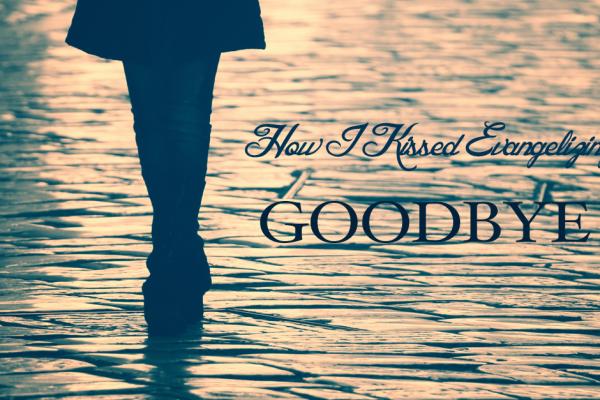I went to the mecca of evangelicalism for college — beautiful campus in the suburbs of Chicago, where I received a scholarship from none other than the Pope of Evangelicalism, Billy Graham, for my work in street evangelism. As in, speaking to random strangers on the street in order to convert them to Christianity. Post graduation, I became a missionary, the Protestant equivalent of achieving sainthood.
I look back on that girl on fire and marvel at her earnest faith. If I could, I would reach back and massage the tense knots out of her high-strung shoulders, weary from carrying the weight of her neighbors’ eternal destinies. I would wistfully explain to her that the first person she tried to witness to, that gentle, drunken, homeless woman named Kathy, needed more than my rehearsed Roman Road to salvation. Then I would break the Temporal Prime Directive and reveal to her that one day she would become more interested in being evangelized than evangelizing.
The truth is, I’m just better at being evangelized. It’s probably how I was so easily converted at the tender age of 12. The young Christian is expected to learn how to share their testimony: their story of how God changes your life. By the time I was in my twenties, I had given my testimony a bajillion times.
But my own story often bored me.
I now realize it is because I didn’t know how to tell it right. I had been given a script with which to impose onto my story. The arc goes like this: I was a sinner, I met Jesus, and then my life was transformed. I tried to squeeze my life into that script, conjuring up all kinds of forced evils for my young life (seeing as before the age of 12 the worst thing I ever did was eat a piece of chocolate during a stint of fundraising for 30-hour famine). Nevertheless, that was the script I dutifully followed, and I learned it well enough to get me accepted into a prestigious Christian college, seminary, and a career in ministry.
I have always been far more interested in other people’s stories. Perhaps it is because I am privileged to have been exposed to many cultures; but the diversity of our human experiences is truly incredible, and I am genuinely drawn into the lives of those around me. People can intuit whether their listener is genuine, and because I am, they offer their stories generously.
What I came to discover is how much the world craves a listening ear. The biggest problem I have with evangelizing is that you enter into a relationship with a prescribed intention, and that stands in the way of listening well.
You can’t listen well when you are carrying an agenda.
You can’t listen well when you are looking for ways to fortify your own position.
You can’t listen well when you are searching for what is broken in your conversation partner, in order to introduce the solution.
On the other hand, if you are wanting to be evangelized, you learn to listen deeper, because you are trying to uncover truth. You search for the beauty in your neighbor to find points of connection — you are seeking to be saved by them. You become the student, longing to learn from, instead of preach at. You voluntarily place yourself in the inferior position of need and find that your own vulnerability compels others to shed their masks. Your courage to admit uncertainty disarms, until all that is left is raw honesty and frailty of our common human condition.
I am not trying to dismiss the profound biblical mandate of the Great Commission, to go and make disciples. But we must assess the context within which we stake the particularity of Christ. The mission of the church is going to look different when you’re in the remote Tibetan tribes of China or in the pluralistic progressive cities of the West. Increasingly, the way we carry out the mission must find distance from colonial proselytizing. As Pope Francis has recently been quoted, “The church grows by attraction, not proselytizing.”
Proselytizing limits the wildly beautiful story of God and God’s people into a sample script. I agree we need more conversions in this world, but at least as many conversions need to take place within the church as outside of it. Are we willing to evangelize each other by offering and receiving a plethora of stories which may diverge from a single narrative? Can we make space for stories from minority groups, the Global South, the Left and the Right, the rich and the poor, the mega churches and the struggling congregations? Can we be evangelized by each other and practice the art of listening deep and listening well?
Our best hope for connectedness lies in having our stories heard. We earn our right to speak into other people’s lives when we have logged enough hours listening to their truths, and been willing to be changed by their beauty. We compel people to join our cause and believe in our God when we thread the Great Commandment into the Great Commission: love your neighbor as yourself. In these days of constant social media noise and soul crushing amounts of information feed — there is no greater love than disciplined, focused, listening. People are hungering to be heard, understood, and connected. Our stories are waiting to be heard.
Listen to other people’s stories as if your salvation depended on it, because I think it might.
Therefore go, and be evangelized.
Cindy Brandt blogs at cindywords.com and serves on the board of One Day's Wages, an organization fighting extreme global poverty. She studied Bible/Theology at Wheaton College and holds a Masters of Arts in Theology from Fuller Seminary.
Image: Robsonphoto/ Shutterstock.com
Got something to say about what you're reading? We value your feedback!
